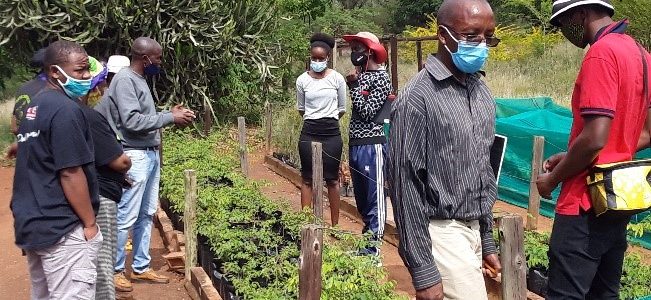As part of the capacity-building pillar, PELUM Eswatini conducted Exchange Visits among member organizations to learn amongst each other and implement in their respective organizations. That way, the organizations extension officers will then share the knowledge with small-scale farmers in their communities. The member organizations that had to showcase their diverse permaculture activities are the following: ACAT Lilima Eswatini, Vusumnotfo, and Guba.
ACAT Lilima Eswatini
Nsingizini community located in the outskirts of Shiselweni Region showcased their different water harvesting and protection techniques and interventions. This included wetland rehabilitation, its benefits to the community for watering their backyard gardens, and household consumption. Various households were visited by the member organization participants in a bid to learn more about the activities done by their ACAT to assist the community. One of the homesteads had a cement tank whereby an ACAT Extension Officer by the name of Blessing Dlamini, took us through on the construction of the tank and its benefits.

Vusumnomtfo
Vusumnotfo, meaning “to restart the economy” in SiSwati, works with 17 communities in the northern parts of Swaziland. Their vision is to see communities sustainably developing their environmental, social, and economic conditions. Additionally, they desire to increase the capacity of individuals and families to be able to identify and pursue their developmental objectives. This organization is located on the outskirts of the Hhohho Region. PELUM Member Organization’s representatives that visited Vusumnotfo learned about the different activities which include permaculture, boreholes in partnership with Water Aid, Indigenous trees which are in the local RDA in partnership with the Forestry Department, and composting toilets. Vusunotfo also works to equip young people in the different communities on how to live sustainably using locally available resources.

Guba
This permaculture haven is located at Malkerns, and during this exchange visit, Member organizations learned about the different services offered by Guba, including various permaculture techniques and skills shared with the neighboring community. They also got a chance to indulge in fresh organic cuisine found prepared on-site using produce from the permaculture garden. The Guba Farm has a fish pond, indigenous chickens, and pigs and to name a few attractions observed by the participants. Guba also demonstrated their different composting techniques which include composting toilets in the compound and, indigenous chickens manure which they break down in different stages for it to be ready to use in the garden. Even their resident’s houses are ecologically friendly made out of Earth brick. Among their activities permaculture classes are conducted whereby interested candidates train and graduate to improve their skills. One of the graduates, Mrs. Dlamini has a permaculture-designed garden and indigenous chickens used for household consumption and as an income-generating method.



